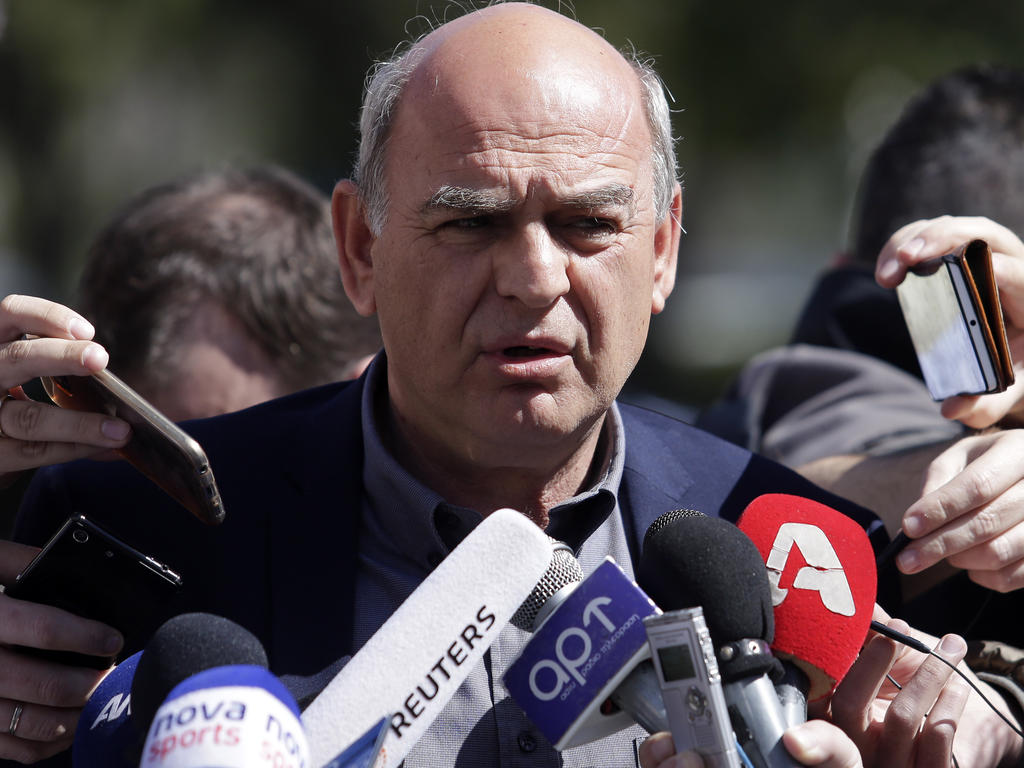Violence-ridden Greek football in danger of 'Grexit': FIFA

World football body FIFA on Wednesday said Greece's violence-ridden championship was on the "edge of a cliff" and Greek clubs faced exclusion from international competition unless authorities took rapid action.
"This behaviour has pushed us to come here to make recommendations," Herbert Hubel, head of the FIFA committee set up last July to monitor the Greek football federation, told a news conference after emergency meetings with Greek officials.
"The Grexit that looked distant is no longer impossible. Greek football reached the edge of the cliff," Hubel said.
Greek football has perennially been plagued by violence and match-fixing, but the latest trouble erupted Sunday after the owner of championship contenders PAOK, Greek-Russian businessman Ivan Savvidis, stormed onto the pitch with a holstered gun at his belt.
He was ostensibly protesting against a goal deemed offside that would have decided a top-of-the-table clash against AEK Athens.
The match was significant because neither Thessaloniki-based PAOK nor AEK have won the Greek title for more than two decades.
Government spokesman Dimitris Tzanakopoulos said the outburst by Savvidis, who is considered a close ally of Prime Minister Alexis Tsipras, was "the last straw."
"It's an episode added to the long list of violence and extremely offensive behaviour that sadly characterise professional football for decades," Tzanakopoulos said.
Just last month, the government had banned fans from the four most powerful clubs -- Olympiakos, Panathinaikos, AEK and PAOK -- from attending away games because of recurring violence.
A few days later, 58 people were handed mostly suspended sentences of 30 months to 10 years in prison for their involvement in a 2011 match-fixing scandal, including a former Greece international punished for illegal betting, an active club chief and two more former club presidents.
The government announced an indefinite suspension of the top-flight league's matches on Monday. Greek football federation chief Vangelis Grammenos said they would not resume for at least another week, pending proposals by clubs on curbing the unrest.
"By March 23 there will be written pledges from all responsible parties to end violence in and outside stadiums and safeguard security," Grammenos told the news conference.
Savvidis, a tobacco industrialist with extensive holdings in Greece, has apologised, but his club faces penalties including relegation after a sports prosecutor on Wednesday requested disciplinary action over the incident.
Savvidis himself faces a stadium ban of three to five years in addition to a fine of at least 50,000 euros ($62,000).
Police were unable to locate Savvidis on Monday after a 24-hour warrant was issued for his arrest for the pitch invasion.
Once the warrant had expired, a photo of him emerged alongside a group of PAOK players, sitting in the lobby of a luxury hotel he runs.
In his apology, Savvidis said his sole aim was to prevent violence from breaking out among the stadium's 30,000 fans over the goal disqualification.
His players defended him Wednesday in a statement calling the Georgia-born, former lawmaker for Russian president Vladimir Putin an "incredible employer and a second father to all of us."
The 58-year-old entrepreneur has been summoned to testify before top-flight Greek league organisers Superleague on Friday.
FIFA's Hubel on Wednesday said there had to be "a promise that all stakeholders lay down their arms, there is no place for violence."
"The aim of the game is to win, but not by force with arms, threats and blackmail," Hubel said.
Hubel had earlier met with deputy sports minister Yiorgos Vassiliadis.
Tsipras has staked his political capital on resolving the crisis, insisting he would disregard any "political cost" to restore order to the league.
But Savvidis' antics have put pressure on the leftist PM, who is accused by rivals of allowing Savvidis to continue a rapid rise in the Greek business world in return for political support and help with privatisations.
His holdings include Thessaloniki's top hotel, a prominent tobacco company, one of Greece's top bottlers, a TV channel and a daily newspaper.
He is also part of a Franco-German consortium that just acquired the port of Thessaloniki, the gateway to the Balkans.




